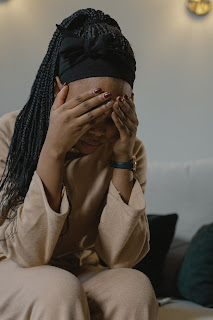 |
When we’re hit with uncertainty either suddenly or in large amounts, it can throw us off. We can get frustrated, overwhelmed, stressed, or discouraged. This is normal and there’s nothing wrong with it. However, it’s my belief that we can train ourselves to stay more balanced when things get chaotic, and stay level-headed and calm, which allows us to become an oasis of sanity that others can rely on.
Let’s talk about how to train ourselves to stay more in balance when things get chaotic.
What Throws Us Off
When we get thrown off, it’s like the rug being pulled out from under us — it feels disconcerting, disorienting, and uncomfortable. We don’t like the feeling.
At the core of this rug-pulling is uncertainty. We feel uncertainty and an uncomfortable disorienting feeling when:
- Someone criticizes us
- Someone acts in a way that we don’t like
- We have a lot to do and we aren’t sure if we can do it all
- Things aren’t going the way we hoped
- We don’t succeed at something
- We’re struggling with something
- And so on
Basically, all the things that frustrate, overwhelm, stress, and discourage us, are things that cause uncertainty and the feeling of disorientation. We react in ways that are typical for us in particular: maybe you react in anger, maybe you start being harsh on yourself, maybe you shut down or hide.
The result is that we feel thrown off, and we can be super stressed or frustrated through a chaotic period in our lives.
How to Stay BalancedIn a sentence: be with everything in your experience, with an attitude of relaxed appreciation.
If you’re sitting outside on a beautiful day, you can be with that experience, and relax with it, fully appreciating it.
If you’re sitting in a rainstorm, you can be with that experience too, with relaxed appreciation.
If during your day you get thrown off and feel overwhelmed or frustrated, this isn’t a problem — be with that feeling, as you would with any experience. You can bring relaxed appreciation to the thunderstorm of your overwhelm or frustration.
If someone is criticizing you or acting in a way that would normally frustrate you, could you be with the experience of them doing that with relaxed appreciation?
If you’re stuck in traffic or plowing through messages, or in a long meeting, can you be with that experience with relaxed appreciation?
Try it now. Be with this moment fully, with relaxed appreciation. It’s always available to you — it’s wonder at the miracle of this moment. It’s a willingness to be with all experiences, no matter how pleasant or unpleasant, comfortable or uncertain.
It’s finding curiosity and love in each moment and finding true appreciation for all of life.
How to Train
This won’t come naturally to most of us. So we can train.
Here’s what I recommend:
- Keep this practice front of mind with some kind of mantra or reminder. I like to write it out on a note that I see often, put it on my phone lock screen, and have a couple reminders pop up.
- No matter what is going on, see if you can fully find a moment of relaxed appreciation and being with the experience.
- When you feel some kind of emotion, be with that fully, and see if you can bring relaxed appreciation.
- When you get thrown off of this practice, be full of the result of that.
- Do a 2-minute review at the end of each day to see how it went. This will deepen your learning and help you remember to practice the next day.
That’s the training. What would it be like for you, to be more balanced when things get uncertain, chaotic, and messy? To be full with all of life, and to appreciate each moment for whatever it brings?
Photo Credit: https://www.pexels.com/photo/thoughtful-black-woman-with-notebook-and-dog-on-leather-sofa-
Photo Credit: Road Puddles Wet - Free photo on Pixabay
Photo Credit: Woman in Chair - Free photo on Pixabay





